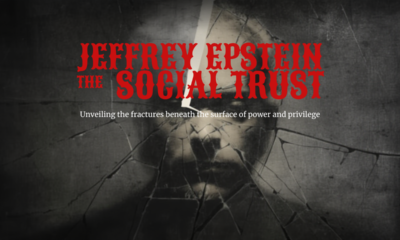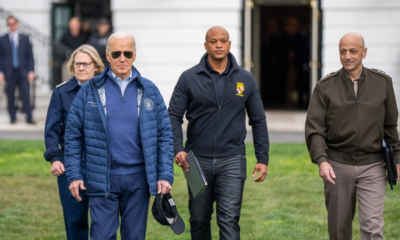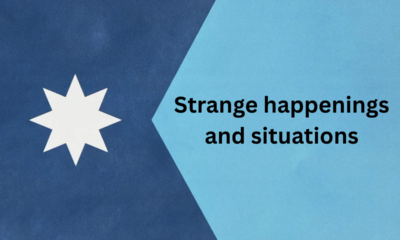Civilization
Palladium Pictures: Incubator for Aspiring Conservative Filmmakers
Palladium Pictures will produce more conservative documentaries like Michael Pack’s documentary about the 1991 Crown Heights Riots.

Palladium Pictures will produce more conservative documentaries like Michael Pack’s documentary about the 1991 Crown Heights Riots.
Earlier this week, the Wall Street Journal editorial page produced a compelling piece of journalism – a 23-minute documentary about the 1991 Crown Heights riots in Brooklyn. Released on Oct. 7 to coincide with the one-year anniversary of the Hamas terror attacks in Israel, the documentary is a bracing reminder that the antisemitic violence of the last year is not new to America.
About the Crown Heights riots
More than three decades later, the Crown Heights riots have largely faded from memory. After a car accident involving the motorcade of a Chabad rabbi killed a young black child on the street and seriously injured another, Brooklyn exploded in destructive riots and antisemitic violence that left one Jew stabbed to death and several others seriously injured. The ugly episode illuminates a lot of political and media problems that remain.
To start, the riots were instrumental in giving legitimacy to the kind of racial demagoguery that dominates political discourse to this day. Al Sharpton had a role in the episode (as he does in the documentary). The violence was also deliberately mischaracterized by biased media coverage. And the riots were not quelled sooner because David Dinkins, New York’s feckless mayor, prioritized his personal political considerations over a proper police response. It’s yet another lesson for cities currently struggling with the fallout of soft-on-crime policies since the George Floyd protests.
While the Crown Heights documentary is an ambitious project for a newspaper, the high quality of the film is no surprise. It was produced, written, and directed by Michael Pack, an experienced and skilled professional – and one of the nation’s very few high-profile documentary filmmakers who openly identifies as politically conservative.
A conservative documentarian and his career
Aside from his career as a filmmaker, Pack served as the CEO of the U.S. Agency for Global Media, appointed to the position in the Trump administration; before that he was a senior vice president for television programming at the Corporation for Public Broadcasting.
What ultimately makes his documentaries respected even by liberal peers is that his politics take a back seat to his work. Pack’s deft touch is the reason that the last full-length documentary, “Created Equal: Clarence Thomas in His Own Words,” earned rave reviews despite the fact that the Supreme Court justice has been a bogeyman of the American left for decades.
“I watch a lot of conservative films, especially documentaries. Few are very good, as I am often told by my friends on the left, and most don’t even coherently tell a story. Preaching at the audience isn’t telling a story,” Pack observed last year. “A series of anecdotes is not a story. A story is something that happens to a protagonist, or a group of protagonists, with a beginning, middle, and end. It has a story arc. Characters change and develop. Ideas emerge from the action.”
At the same time, Netflix, HBO, and other streaming services are pushing documentaries to the forefront the cultural discussion – and the lack of conservative documentarians means that this discussion is dominated by the left.
Conservative filmmaking has fallen behind
“It’s not the fault of the left or the progressives. The woke side is to be commended for making films that show their point of view and fighting a war of ideas. That’s what’s supposed to happen in a democracy; the failure is totally on the right,” Pack told RealClearPolitics. “We have the money. We’ve had the time. We have failed. On the other hand, now we know what they’ve done, and we can imitate it.”
To that end, his latest project might prove to be his most lasting professional contribution: He has launched a documentary incubator to train aspiring filmmakers who are coming from ideological perspectives outside the industry’s dominant liberalism.
He didn’t have to look very far to find someone to help manage the project. Pack’s longtime business partner and co-producer is his wife, Gina Cappo Pack, and for this latest project he has enlisted his son Thomas, who shares his father’s passion for cultivating young talent.
Above all, Thomas says aspiring documentarians have to “make story-oriented, narrative-driven documentaries that can move people in the middle.” His father heartily agrees.
“We’re not making films that are convincing to the middle, and the left does a good job of that. [Conservatives] are not doing research … and they don’t pay attention to the form and the rhythm and the music and the other elements that make it work. And on the left there’s this entire system to train documentary filmmakers, beginning with film schools.”
A new company to right the balance
Through their new company, Palladium Pictures, the Packs aim to at least offer an alternative. “We have our inaugural class, and there’s four people in it,” Thomas says. “They applied with an idea for a short documentary film, and provided a work sample, where they demonstrated their talent and that they know something about how to make a film. So these aren’t exactly student films. These are people who have produced and directed something before.”
The inaugural class was given a budget of $30,000 each to make a short documentary (15-25 minutes). The filmmakers were flown to D.C. to work with the Packs to get their projects started.
So far, the work of the inaugural class looks promising. The first explores an unsolved murder in rural California that may be connected to drug cartels. Another is a period piece telling the story of two college basketball teams in Jim Crow-era North Carolina that defied the law to play an interracial basketball game. The third focuses on people who adopt “excess” embryos created through IVF procedures, “taking viewers on a riveting journey through ethical, scientific, and legal landscapes of this new and bizarre technology.” The final documentary details how the Babylon Bee, a satirical conservative website, was regularly censored on social media and found itself fighting for free speech.
A program to get into the fight
After the finishing touches on these films begins the challenge of marketing and distributing them. Regardless of their ultimate success, Thomas Pack notes the primary benefit of their incubator is for the filmmakers themselves, as it “is one of only a few programs that is helping them not just advance their careers, but grow as artists.”
“It isn’t really a culture war when only one side is fighting,” adds Michael Pack. “They make films, we complain about their left-wing bias. It’s like a war where one side has an army and the other side is writing articles about bad armies. Who’s going to win the war?”
This article was originally published by RealClearPolitics and made available via RealClearWire.
Mark Hemingway reports on the key institutions shaping public life, from lobbying groups to federal agencies to elections, for RealClearInvestigations. His writing has appeared in USA Today, Wall Street Journal, MTV.com, and The Weekly Standard.
-

 Civilization5 days ago
Civilization5 days agoMaduro’s Capture: U.S. Foreign Policy in Latin America
-

 Guest Columns5 days ago
Guest Columns5 days agoA Bipartisan Fix for the Prescription Drug Market
-

 Civilization3 days ago
Civilization3 days agoA Better U.S. Strategy for Greenland Than Annexation
-

 Education3 days ago
Education3 days agoIgnoring the Science: The Curious Case of Cell Phone Bans
-

 Guest Columns4 days ago
Guest Columns4 days agoWaste of the Day: Thousands of Earmarks in Illinois State Budget
-

 Education4 days ago
Education4 days agoA Solid Core Enlivens Free Speech and Viewpoint Diversity
-

 Executive2 days ago
Executive2 days agoWaste of the Day: Utah University Trustees Don’t Know Their Job
-

 Civilization4 days ago
Civilization4 days agoEnd the Filibuster – Or Stop Pretending To Govern














